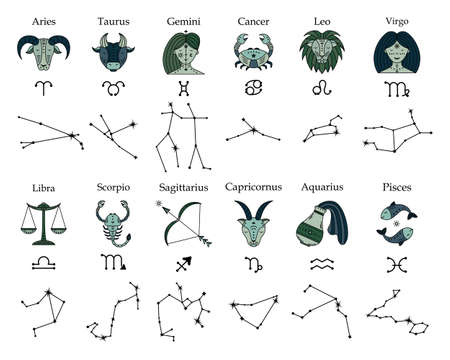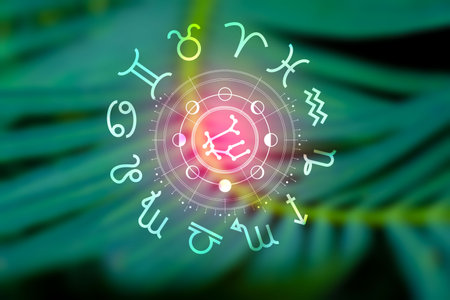Introduction to Indian Astrology and Love Matches
In the vibrant tapestry of Indian culture, astrology holds a cherished place—especially when it comes to matters of the heart. The compatibility between zodiac signs is not just a fun conversation starter here; it’s an integral part of relationship decisions, often guiding families and individuals alike. One of the most respected traditions is Kundali matching, also known as horoscope matching, which plays a pivotal role in assessing whether two people are well-suited for love and marriage. This ancient practice considers the alignment of stars and planets at the time of birth, aiming to predict harmony, happiness, and prosperity in married life. For many Indians, these astrological insights provide reassurance and guidance when stepping into one of life’s most important commitments: choosing a life partner.
Significance of Rashi and Nakshatra Compatibility
In Indian astrology, the foundation of matching horoscopes for love and marriage goes much deeper than just knowing your Sun sign. Two of the most important concepts are Rashi (Moon Sign) and Nakshatra (constellation or lunar mansion). Understanding the distinction between these two helps reveal why some zodiac matches are considered more auspicious than others.
What is Rashi?
Rashi refers to the position of the Moon in a particular zodiac sign at the time of your birth. There are 12 Rashis, each corresponding to one of the familiar zodiac signs, such as Mesh (Aries), Vrishabh (Taurus), Mithun (Gemini), and so on. In Indian culture, your Rashi is crucial because it influences your emotional nature, instincts, and how you relate to others—especially in relationships.
What is Nakshatra?
Nakshatra, on the other hand, divides the celestial belt into 27 segments or constellations. Each Nakshatra covers 13 degrees and 20 minutes of the zodiac and has its unique characteristics, ruling deities, and symbolic meaning. The Nakshatra in which your Moon is placed at birth is seen as a deeper layer of your personality and destiny.
Key Differences: Rashi vs. Nakshatra
| Aspect | Rashi (Moon Sign) | Nakshatra (Constellation) |
|---|---|---|
| Number | 12 Rashis | 27 Nakshatras |
| Focus | Zodiac sign where Moon is placed | Lunar mansion or constellation where Moon is placed |
| Main Influence | Emotions & temperament | Karmic patterns & life path |
| Cultural Use | Name selection, general compatibility checks | Detailed matchmaking & Muhurat selection |
The Role in Matchmaking
Both Rashi and Nakshatra are checked during Kundli Milan (horoscope matching) before a relationship or marriage proposal moves forward. While Rashi compatibility gives a broad understanding of emotional harmony, Nakshatra compatibility dives into finer details like longevity, prosperity, health, and mutual respect between partners. A match may be considered highly auspicious if both Rashi and Nakshatra align well—this is what many Indian families look for when seeking a perfect match for their loved ones.

3. Auspicious Zodiac Pairings According to Vedic Astrology
In the colourful world of Indian astrology, certain zodiac combinations are celebrated as especially harmonious for love and marriage. These pairings are believed to bring joy, stability, and long-lasting affection in relationships. Here are some well-regarded matches that often get a thumbs up from astrologers and elders alike:
Mesha (Aries) & Simha (Leo)
Both signs radiate fiery energy and confidence. This dynamic duo is known for their mutual respect and shared ambitions, making them a power couple in both Bollywood movies and real life. Their partnership is full of excitement and support.
Vrishabha (Taurus) & Kanya (Virgo)
This earthy combination is often seen as the backbone of Indian households. With practicality from Virgo and steadfastness from Taurus, they create a peaceful home environment where love grows slowly but surely—much like a perfect homemade chai.
Mithuna (Gemini) & Tula (Libra)
The air element connects these two. Together, they have great communication and intellectual understanding. Their relationship is filled with lively conversations, laughter at family gatherings, and shared dreams—think of it as a never-ending adda (friendly chat).
Karka (Cancer) & Meena (Pisces)
A match made in heaven for emotional depth! Both water signs, Cancer and Pisces nurture each other’s feelings. They are the couple who will always remember anniversaries and celebrate festivals with extra warmth and devotion.
Dhanu (Sagittarius) & Kumbha (Aquarius)
This pairing loves adventure and freedom. Sagittarius brings optimism while Aquarius adds innovation; together, they’re ready to explore new places—from Ladakh to Goa—and try everything from yoga retreats to street food stalls.
Of course, while these auspicious pairings are cherished in many Indian families, love can bloom anywhere! But if you’re seeking blessings from the stars—and maybe your dadi’s approval—these matches are always worth considering.
4. Doshas and Their Impact on Love Matches
In Indian astrology, the concept of doshas plays a crucial role when checking for auspicious zodiac matches, especially for love and marriage. Doshas are astrological imbalances or defects that can potentially affect a couple’s compatibility and happiness together. Among the most talked-about is the Manglik Dosha, but there are several others that astrologers consider during kundali matching.
Manglik Dosha: The Fiery Influence
Manglik Dosha, also called Mangal Dosha, occurs when Mars (Mangal) is placed in certain houses in a person’s birth chart. This dosha is believed to bring challenges in marital life, such as misunderstandings or delays in marriage. In Indian culture, it’s common for families to check both partners’ charts to see if either is Manglik before moving forward with a match. If both are Manglik, their energies may balance out, making the match more acceptable.
Other Common Doshas Considered During Matchmaking
Besides Manglik Dosha, there are other significant doshas that astrologers take into account:
| Dosha Name | Planetary Influence | Potential Impact |
|---|---|---|
| Nadi Dosha | Nadi (Pulse energy) | Affects health and progeny; considered highly inauspicious if present |
| Bhakoot Dosha | Moon sign positions | Can lead to financial or emotional instability between partners |
| Gana Dosha | Personality classification (Deva, Manushya, Rakshasa) | Affects temperament compatibility and mutual understanding |
| Mangal/Manglik Dosha | Mars placement | May cause conflicts or delays in marriage; remedies are often suggested |
The Importance of Remedies and Rituals
If a dosha is found during horoscope matching, traditional remedies (upayas) are often suggested by astrologers. These might include performing specific pujas (prayers), reciting mantras like Hanuman Chalisa, or even conducting special rituals such as Kumbh Vivah (a symbolic marriage with a sacred object). In modern India, many couples and families still value these remedies to ensure harmony and blessings in their love life.
Cultural Perspective on Doshas in Modern India
While some urban Indians may consult astrology more for peace of mind than strict belief, the concept of doshas remains deeply woven into matchmaking traditions across communities. Whether it’s through arranged marriages or love marriages seeking family approval, checking for doshas is often seen as an extra step toward ensuring an auspicious and harmonious union.
5. Remedies and Rituals for Strengthening Zodiac Matches
Even if a couple’s horoscopes don’t align perfectly, Indian astrology offers many remedies and rituals to harmonize their relationship. These time-honoured practices are deeply rooted in Indian culture and are widely followed by couples seeking stronger bonds and marital bliss.
Puja for Relationship Harmony
One of the most common remedies is performing specific pujas (prayers) dedicated to deities like Lord Shiva and Goddess Parvati, who symbolize ideal marital union. The “Gauri Shankar Puja” is particularly popular among couples facing compatibility issues, as it is believed to invoke blessings for unity and understanding.
Wearing Gemstones
Astrologers often suggest wearing certain gemstones based on one’s birth chart to balance planetary influences. For example, a couple might be recommended to wear yellow sapphire or emerald to enhance love and reduce misunderstandings, depending on their individual zodiac signs and planetary positions.
Reciting Mantras
Chanting specific Vedic mantras is another way couples try to mitigate negative astrological effects. Reciting the “Mahamrityunjaya Mantra” or “Swayamvara Parvati Mantra” is believed to foster marital happiness and protect against discord.
Kundali Dosh Nivaran Rituals
If there are doshas (flaws) in the kundali, such as Mangal Dosha (Mars affliction), special rituals like “Mangal Dosh Nivaran Puja” are performed. These are said to neutralise negative energies and promote harmony between partners.
Fasting and Charity
Many couples observe fasts on auspicious days, such as Mondays for Lord Shiva or Fridays for Goddess Lakshmi, with prayers for a happy married life. Donating food, clothes, or money to the needy is also considered a powerful remedy to attract positive vibrations and blessings for the relationship.
These remedies and rituals reflect the Indian belief that love can be nurtured with faith, devotion, and a little help from the stars. While not everyone may follow all traditions strictly, these practices continue to be cherished by those who seek cosmic support in their journey of love.
6. Cultural Nuances and Modern Perspectives
India is a land of rich traditions, where astrology has long played a key role in matchmaking and love compatibility. However, the views on astrological compatibility are evolving, especially among the younger generation. While many families still consult astrologers to match kundalis (birth charts) before marriage, modern couples are increasingly prioritising personal connection, understanding, and shared values over strictly following zodiac advice. There is a growing acceptance that while traditional beliefs offer guidance, true compatibility also comes from open communication and emotional bonding. In urban India, it’s common to see couples using astrology as one of many factors in their relationship journey rather than the sole deciding element. This blending of tradition with contemporary ideas reflects India’s dynamic culture—honouring the wisdom of the stars while embracing individual choice in matters of the heart.

